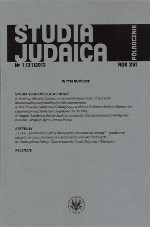Marrani, Spinoza i moc niejednoznaczności. Przyczynek do antropologicznej analizy zjawiska marranizmu
Marranos, Spinoza and the Power of Ambiguity: Towards an Anthropological Analysis of the Marrano Phenomenon
Author(s): Aleksandra BilewiczSubject(s): Jewish studies
Published by: Wydawnictwa Uniwersytetu Warszawskiego
Keywords: Marrani; Marrans; Spinoza; Sefardyjczycy
Summary/Abstract: The aim of this article is to present a new anthropological interpretation of secular trends among the marranos of the sixteenth and seventeenth century. Referring to Mary Douglas’ concept of impurity and to Victor Turner’s notion of liminality as well as to some historical records on the marranos’ way of life and their religiosity, the author shows that the marrano, torn apart between the Jewish and Christian worlds, is placed beyond the accepted and unambiguous social categories and therefore perceived as a threat to social order. In the second part of the article examples of skeptical, rational or even atheist marrano attitudes are analyzed. A special emphasis was placed on the philosophical work of Baruch Spinoza who proposes in his Tractatus theologico-politicus a secular vision of a state based on tolerance and freedom of speech. Spinoza’s efforts are shown as a marrano rationalist’s struggle to overcome the “marrano condition,” i.e. a condition of people forced to live on the margin of society due to their hybrid status. The new secular identity can be therefore understood as a response to unresolved conflicts generated by the social position of the marranos.
Journal: Studia Judaica
- Issue Year: 16/2013
- Issue No: 31
- Page Range: 3-34
- Page Count: 32
- Language: Polish

